Post by Bonobo on Sept 6, 2016 22:31:36 GMT 1
In 1877, the Colorado beetle reached Germany where it was eradicated. During or immediately following WWI, it became established near USA military bases in Bordeaux and proceeded to spread by the beginning of WWII to Belgium, the Netherlands and Spain. The population increased dramatically during and immediately following WWII and spread eastward, and the beetle is now found over much of the continent. After World War II, in the Soviet occupation zone of Germany, almost half of all potato fields were infested by the beetle by 1950. The GDR government made the claim that the beetles were dropped by American planes.
The travel of the beetle across European continent
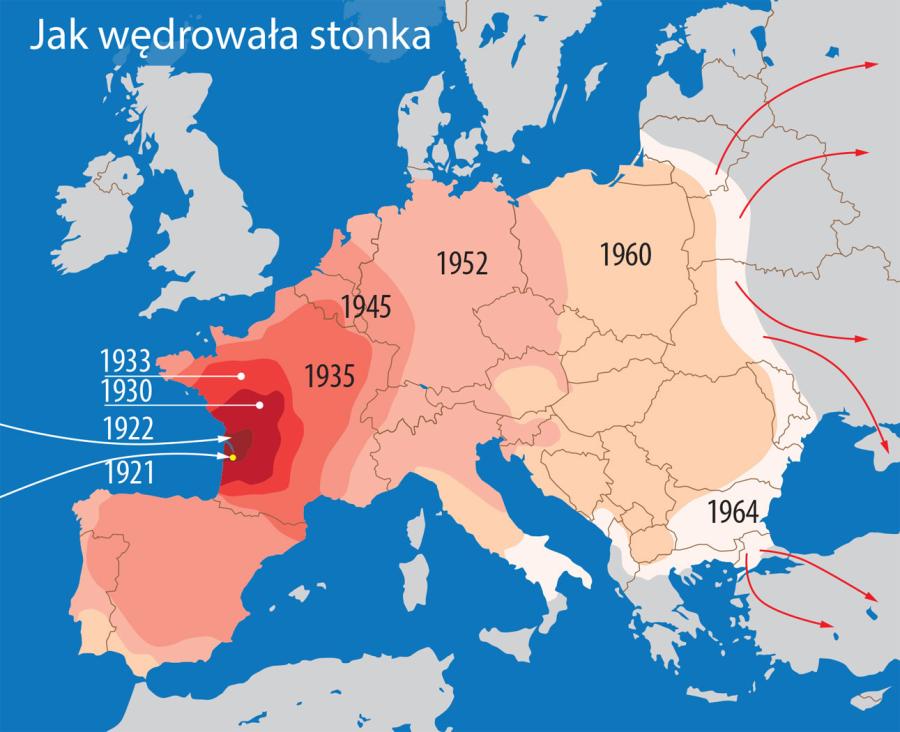
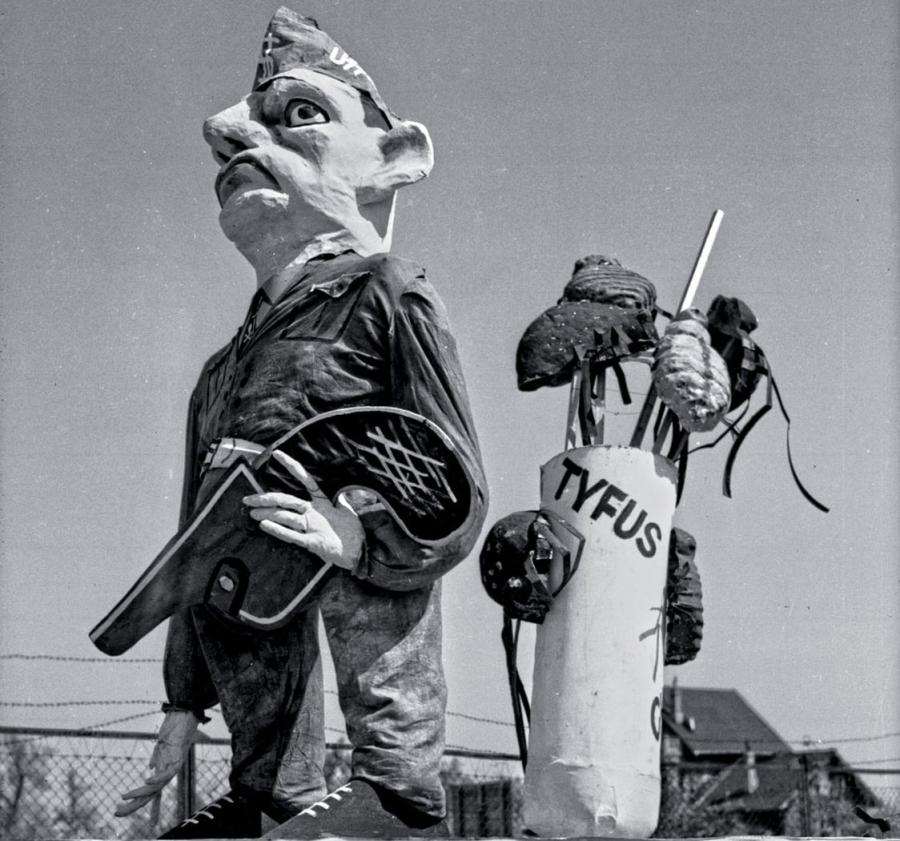
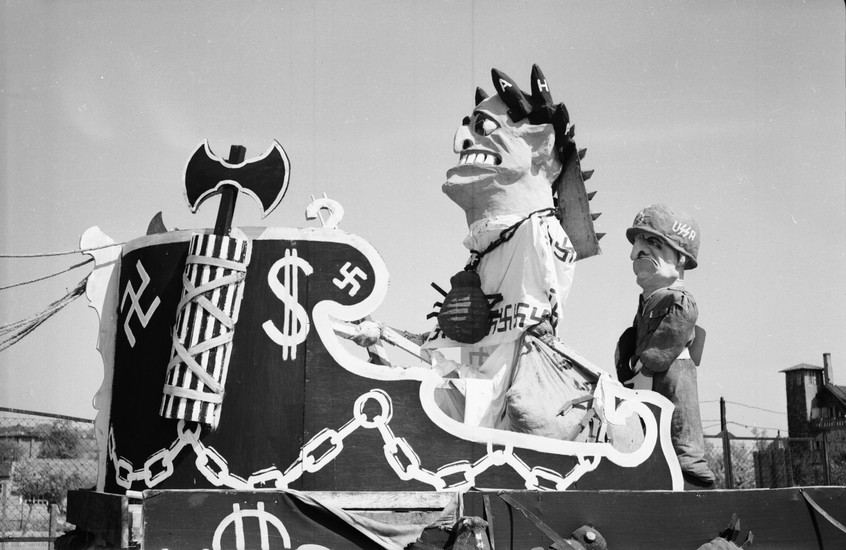
The war against the potato beetle was a campaign launched in Warsaw Pact countries during the Cold War to eradicate the Colorado potato beetle (Leptinotarsa decemlineata). It was also a propaganda operation that alleged that the insect was introduced into East Germany, the People's Republic of Poland and Czechoslovakia by the United States as a form of entomological warfare. Communist propaganda of the time claimed that the insect was being dropped from parachutes and balloons, with the intent of immiserizing the populations of these countries, causing famines, and facilitating an economic crisis.[1]
People's Republic of Poland
In Poland, the war against the potato beetle (stonka) began in the second half of the 1940s. Articles on the plague appeared in major newspapers and farmers' magazines such as Przysposobienie Rolnicze i Wojskowe ("Agricultural and Military Almanac"). The official organ of the ruling communist Polish United Workers' Party Trybuna Ludu ("People's Tribune") reported that after being dropped on the Baltic Sea by American planes, the beetle emerged onto land and began to wage "sabotage and diversionary actions aimed at socialist Poland". As a result, the communist government declared a "merciless war against the beetle". A Naczelny Nadzwyczajny Komisarz ("General Special Commissar") was appointed to oversee the assault on the beetles, the country was divided into strategic sectors, and battle maps indicating enemy positions were drawn up. Simultaneously, instructions were issued to farmers describing simple and effective ways of eradicating the pest if pesticides were not available; for instance drowning specimens in water with a small admixture of kerosene. Even Poland's socialist poets joined the struggle, exemplified by Maria Kownacka's poem Alarm, which instructs farmers to "protect the potatoes!!!" and tells either the beetle or the imperialists that "we will not let ourselves to be starved!!!" (exclamation marks in original).[6]
A Polish newsreel from 1950, "Walka z stonką" ("The struggle against the beetle"), claimed that "the progressive opinion of the world has rightfully condemned the crimes of the American pilots who dropped tremendous amounts of the potato beetle on the fields of the German Democratic Republic... from where the beetle invaded Polish territory". The news report went on to describe the campaign launched by the Polish Ministry of Agriculture to eradicate the pest through the use of DDT (Azotox in its Soviet bloc version), vigilance on Poland's Baltic coast, engagement of the Polish Air Force, and the general mobilization of society, particularly the youth. The newsreel concluded that "the American pest will be unsuccessful both in Poland and Germany. The warmongers' provocation will crash and burn. Everyone to war against the beetle!"[7]
In a 1951 book published by the Polish Ministry of Defense, Zofia Kowalska wrote that American planes dropped beetles, "violating sovereign airspace", on the night of 24 May in East Germany, in the Zwickauer Land of Saxony.[8]
In Poland, the propaganda campaign associated with the beetle ended by the beginning of the 1960s.
Western response
In response to the allegations issued by the Soviet bloc countries' governments, the US issued tepid denials.[5] In August 1950, at the suggestion of the CIA, the West German authorities printed postcard-sized cardboard replicas of the potato beetle and stamped these with political slogans and the letter "F" for "Freiheit" ("Freedom"). A number of these were sent to all the municipal governments in East Germany and the rest dropped from a balloon over East German territory as a joke.[9]

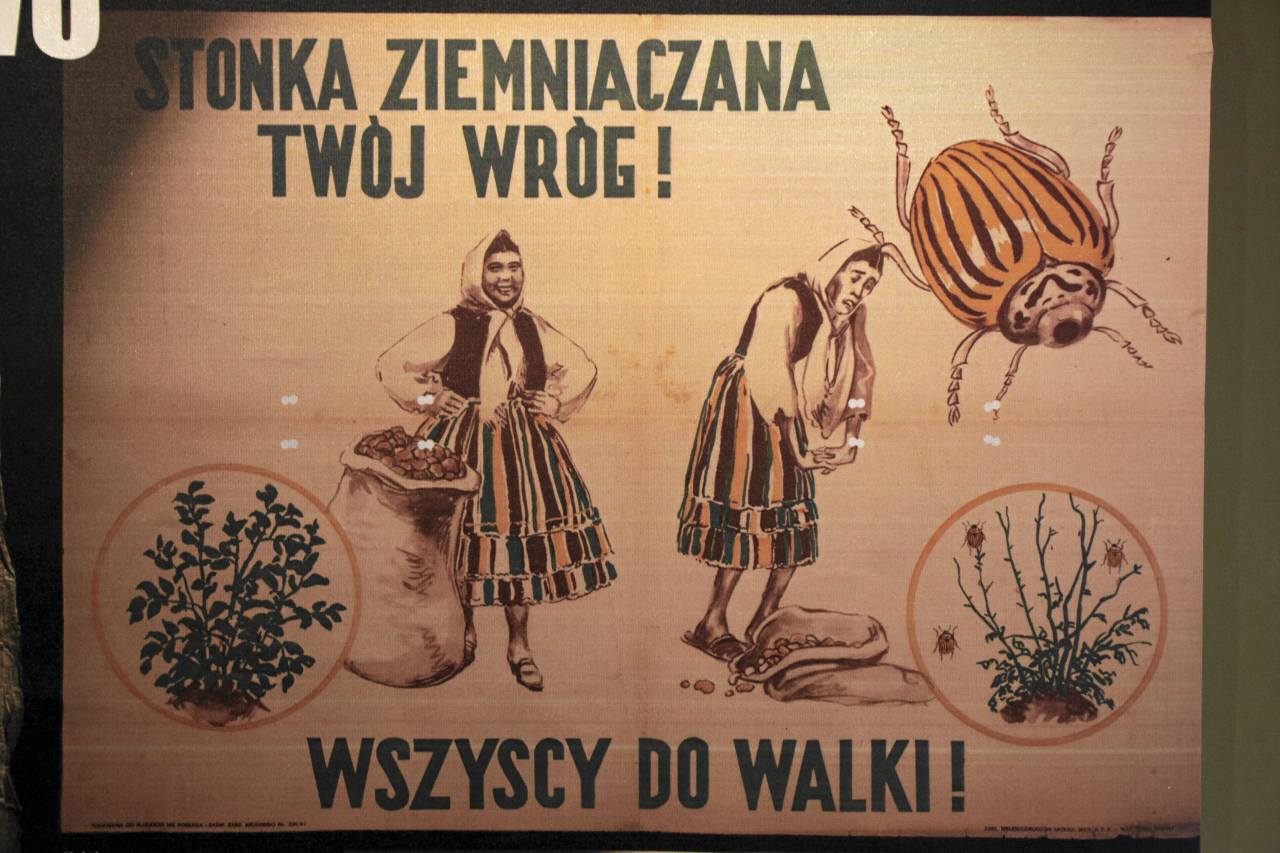
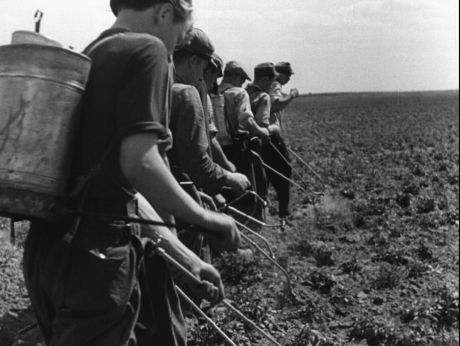



The travel of the beetle across European continent


The war against the potato beetle was a campaign launched in Warsaw Pact countries during the Cold War to eradicate the Colorado potato beetle (Leptinotarsa decemlineata). It was also a propaganda operation that alleged that the insect was introduced into East Germany, the People's Republic of Poland and Czechoslovakia by the United States as a form of entomological warfare. Communist propaganda of the time claimed that the insect was being dropped from parachutes and balloons, with the intent of immiserizing the populations of these countries, causing famines, and facilitating an economic crisis.[1]
People's Republic of Poland
In Poland, the war against the potato beetle (stonka) began in the second half of the 1940s. Articles on the plague appeared in major newspapers and farmers' magazines such as Przysposobienie Rolnicze i Wojskowe ("Agricultural and Military Almanac"). The official organ of the ruling communist Polish United Workers' Party Trybuna Ludu ("People's Tribune") reported that after being dropped on the Baltic Sea by American planes, the beetle emerged onto land and began to wage "sabotage and diversionary actions aimed at socialist Poland". As a result, the communist government declared a "merciless war against the beetle". A Naczelny Nadzwyczajny Komisarz ("General Special Commissar") was appointed to oversee the assault on the beetles, the country was divided into strategic sectors, and battle maps indicating enemy positions were drawn up. Simultaneously, instructions were issued to farmers describing simple and effective ways of eradicating the pest if pesticides were not available; for instance drowning specimens in water with a small admixture of kerosene. Even Poland's socialist poets joined the struggle, exemplified by Maria Kownacka's poem Alarm, which instructs farmers to "protect the potatoes!!!" and tells either the beetle or the imperialists that "we will not let ourselves to be starved!!!" (exclamation marks in original).[6]
A Polish newsreel from 1950, "Walka z stonką" ("The struggle against the beetle"), claimed that "the progressive opinion of the world has rightfully condemned the crimes of the American pilots who dropped tremendous amounts of the potato beetle on the fields of the German Democratic Republic... from where the beetle invaded Polish territory". The news report went on to describe the campaign launched by the Polish Ministry of Agriculture to eradicate the pest through the use of DDT (Azotox in its Soviet bloc version), vigilance on Poland's Baltic coast, engagement of the Polish Air Force, and the general mobilization of society, particularly the youth. The newsreel concluded that "the American pest will be unsuccessful both in Poland and Germany. The warmongers' provocation will crash and burn. Everyone to war against the beetle!"[7]
In a 1951 book published by the Polish Ministry of Defense, Zofia Kowalska wrote that American planes dropped beetles, "violating sovereign airspace", on the night of 24 May in East Germany, in the Zwickauer Land of Saxony.[8]
In Poland, the propaganda campaign associated with the beetle ended by the beginning of the 1960s.
Western response
In response to the allegations issued by the Soviet bloc countries' governments, the US issued tepid denials.[5] In August 1950, at the suggestion of the CIA, the West German authorities printed postcard-sized cardboard replicas of the potato beetle and stamped these with political slogans and the letter "F" for "Freiheit" ("Freedom"). A number of these were sent to all the municipal governments in East Germany and the rest dropped from a balloon over East German territory as a joke.[9]










